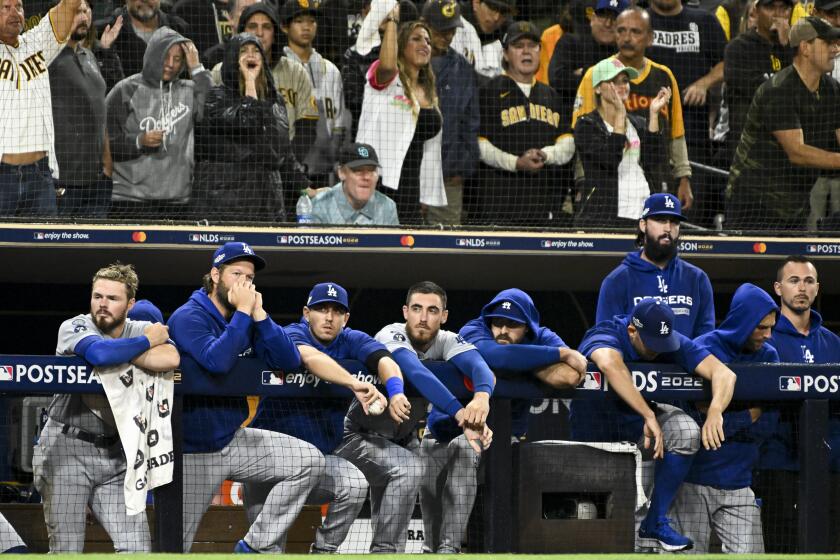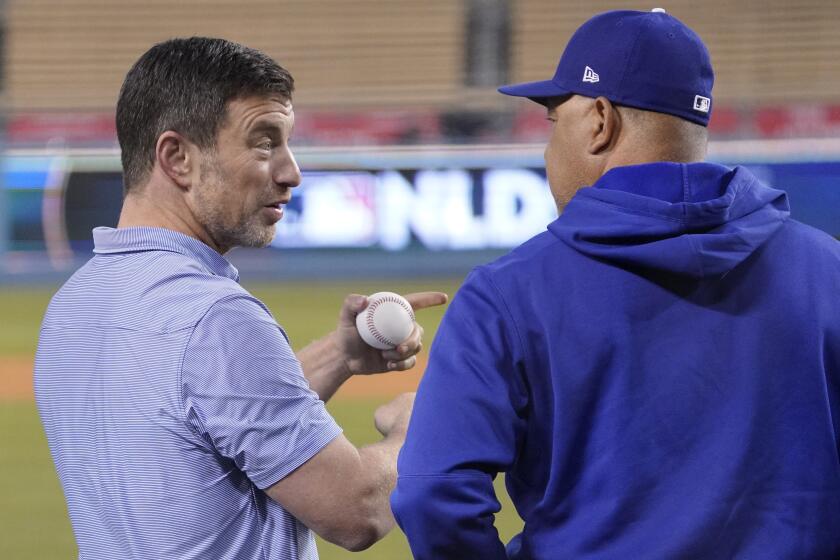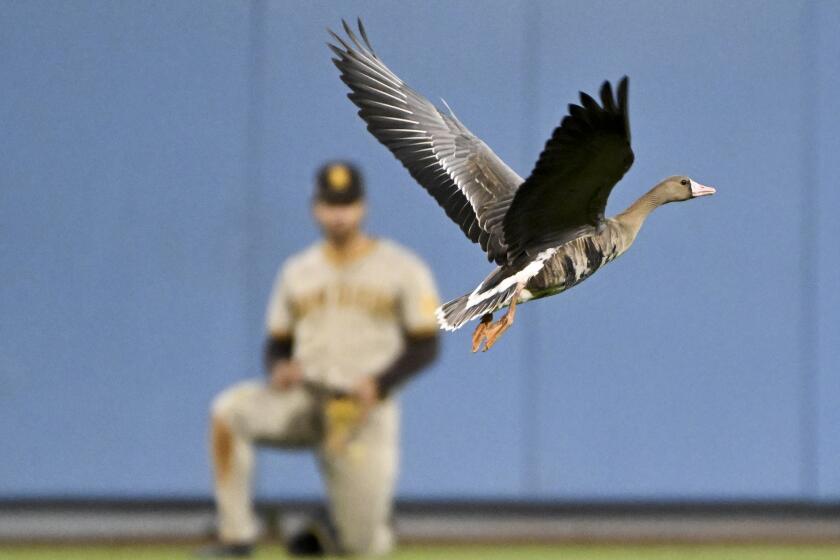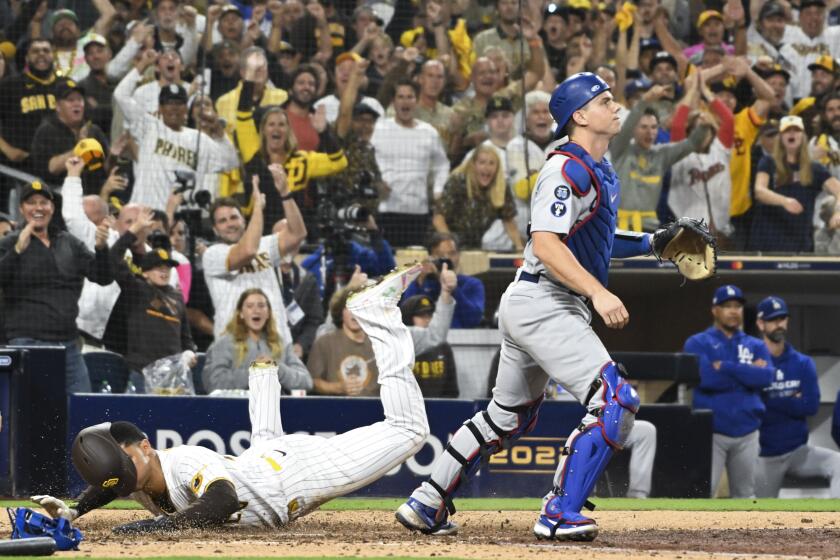Dodgers disaster unfolds in seventh-inning meltdown and season-ending loss to Padres

- Share via
SAN DIEGO — The disaster unfolded in slow motion, a train wreck of an inning, of a playoff series, of a once-promising and historic 2022 season.
The Dodgers entered the bottom of the seventh Saturday night leading the San Diego Padres by three runs.
They ended the frame trailing by two, a combination of bad execution, puzzling decision-making and relentless Padres hitting paving the way for a 5-3 loss in Game 4 of the National League Division Series that eliminated the Dodgers from the playoffs.
In their worst nightmares, they couldn’t have concocted a more harrowing scene.
“The shock factor is very high,” manager Dave Roberts said. “Disappointment very high. It’s crushing.”
The decisive seventh inning began with a walk by reliever Tommy Kahnle, then a first-pitch single from Padres postseason hero Trent Grisham.
It escalated when Austin Nola reached on a single to second base, scoring one run and putting the tying runs aboard.
Plaschke: Dodgers go from biggest winners to biggest losers with worst upset in their history
Barely a week after setting a franchise record with 111 regular-season victories, the Dodgers see their season end in an NLDS loss to the Padres.
It got worse when Roberts went to the bullpen, bypassing his best reliever, Evan Phillips, in case of a ninth-inning save opportunity and instead summoning Yency Almonte, who promptly gave up an RBI double to Ha-Seong Kim and RBI single to Juan Soto that tied the score.
Then, it all culminated in a shocking moment now destined for infamy.
At the start of a two-out at-bat to Jake Cronenworth, a pickoff signal from the dugout, which was intended to give left-handed reliever Alex Vesia more time to warm up in the bullpen, was missed. Almonte fired a first-pitch ball to the plate instead.
Despite the mistake, Roberts still decided to make the pitching change in the middle of the at-bat. It backfired moments later, when Vesia gave up a two-run single that broke the tie and ultimately decided the game.
That 2019 loss to the Washington Nationals in Game 5 of the NLDS?
It suddenly has company.
“We didn’t accomplish our goal, and that’s the bottom line,” Roberts said. “Yeah, this one hurts.”

This wasn’t supposed to happen to this year’s Dodgers team.
Not after they won a franchise-record 111 games, giving them the postseason’s top overall seed.
Not after they talked about this being their most talented lineup, their deepest bullpen, their most complete team of the last 10 years.
Especially not after Roberts brashly guaranteed a World Series title before the start of the season, when he said on a radio show that the Dodgers would be champions so long as “we play a full season and there is a postseason.”
A full season will be completed. But the Dodgers fell woefully short of hanging around until the end.
Hernández: Blame Andrew Friedman’s roster construction, pitcher strategy for Dodgers’ collapse
Dodgers manager Dave Roberts doesn’t deserve all the blame for the Dodgers’ season ending in grim fashion. Andrew Friedman also needs to be scrutinized.
The day he made his title prediction, Roberts also added a caveat about the need for healthy starting pitching. In their disastrous loss at Petco Park, however, it was a capitulation by the bullpen that sealed their three-games-to-one defeat in the best-of-five series.
After the bullpen was one of the team’s few strengths during the first three games, three relievers combined to give up five runs on five hits and two walks in the fateful seventh inning.
Roberts was left answering questions about several of the team’s decisions, as well.
“Nothing I can say is going to make it feel any better,” Roberts said. “Obviously we didn’t expect to be in this position.”
The seventh-year manager, whose tenure includes a 2020 World Series but October failures in every other season, still tried.
Despite insisting for weeks that the team felt comfortable not designating a closer and allowing matchups to instead dictate in-game pitching decisions, they apparently changed course Saturday, opting to save Phillips for a potential ninth-inning opportunity once they took an early lead.
That meant, once Kahnle got into trouble in the seventh, it was Almonte who came to the mound.
It did not go well.
One expert said the goose, a greater white fronted goose, may have been migrating from Alaska to Mexico and was caught in the bright lights at Dodger Stadium.
While Almonte was having a strong series, he was ineffective in Game 4. Kim sent a bouncing ball past Max Muncy at third to make it 3-2. Soto ripped an elevated sinker into right to make it 3-3.
As Vesia started to warm, Almonte did get a couple outs, fanning Manny Machado before inducing a pop up from Brandon Drury on the next pitch.
But with Cronenworth, a left-handed hitter, coming to the plate, Roberts said the plan was to have Almonte throw over to first base and give the left-handed Vesia — who later said he was already warm by then — a few more moments before coming in.
Instead, the sign was missed, Almonte threw the pitch, and suddenly Roberts was facing a decision with no good answers: Leave Almonte in for the rest of the at-bat, or go to Vesia even in a 1-and-0 count.
He chose the latter.
“I still liked the matchup right there,” Roberts said.
It didn’t matter.
After Soto stole second to get in scoring position, Vesia threw a 2-and-2 slider just off the plate that Cronenworth roped into center, giving the Padres a lead they wouldn’t surrender.
“I got the proper warmup, went out,” Vesia said. “Made it a 2-2 count, left a slider up and he got a good piece of it.”

Highlights from Game 4 of the NLDS between the Dodgers and San Diego Padres.
Catcher Will Smith — whose wife, Cara, gave birth to their daughter earlier on Saturday — acknowledged there was “a little miscommunication” during the sequence with Almonte and the missed throw over sign.
“Somehow, the sign didn’t get there,” he said. “That’s not why we lost the game.”
It certainly didn’t help, though, not after a string of other missed opportunities by the Dodgers earlier in the game.
While they opened the scoring on Freddie Freeman’s two-run double in the second inning — snapping the team’s 0-for-20 skid with runners in scoring position going back to Game 1 — and stayed in front thanks to Tyler Anderson’s scoreless five-inning start, they failed to fully put the game away.
They still went only two for nine with runners in scoring position. They still stranded nine men on base. And while they made it 3-0 in the top of the seventh on a sacrifice fly from Smith, that was the only run they mustered from a bases-loaded, no-out situation.
Overall, they scored just seven runs while dropping the final three games of the series.
In completing a stunning NLDS triumph Saturday night, the little-brother San Diego Padres truly became rivals of the big-brother Dodgers.
“I’m sure there was a three-game span during the course of the regular season when we didn’t so well either,” Freeman said. “It’s just unfortunate that it happened in October.”
After the seventh inning, they couldn’t respond either, making six straight outs to end the game amid a sudden — and all-too-fitting — downpour of rain.
“We had our chances,” right fielder Mookie Betts said. “We just never got that hit.”
“It sucks, it really sucks, you know?” Chris Taylor added amid a dreary postgame scene. “Every year you don’t win, it’s really hard. We always expect to win, so this is nothing new. We’ve been here before. Never feels any better. Feels the same.”
The way it unfolded, however, will rank among the most shocking collapses the Dodgers have ever seen.
The bottom of the seventh inning, from the poor pitching to the missed pickoff to the roaring scene of 45,139 fans cheering in disbelief, will sting long into the winter — one that for the Dodgers has once again come too soon.
More to Read
Are you a true-blue fan?
Get our Dodgers Dugout newsletter for insights, news and much more.
You may occasionally receive promotional content from the Los Angeles Times.















